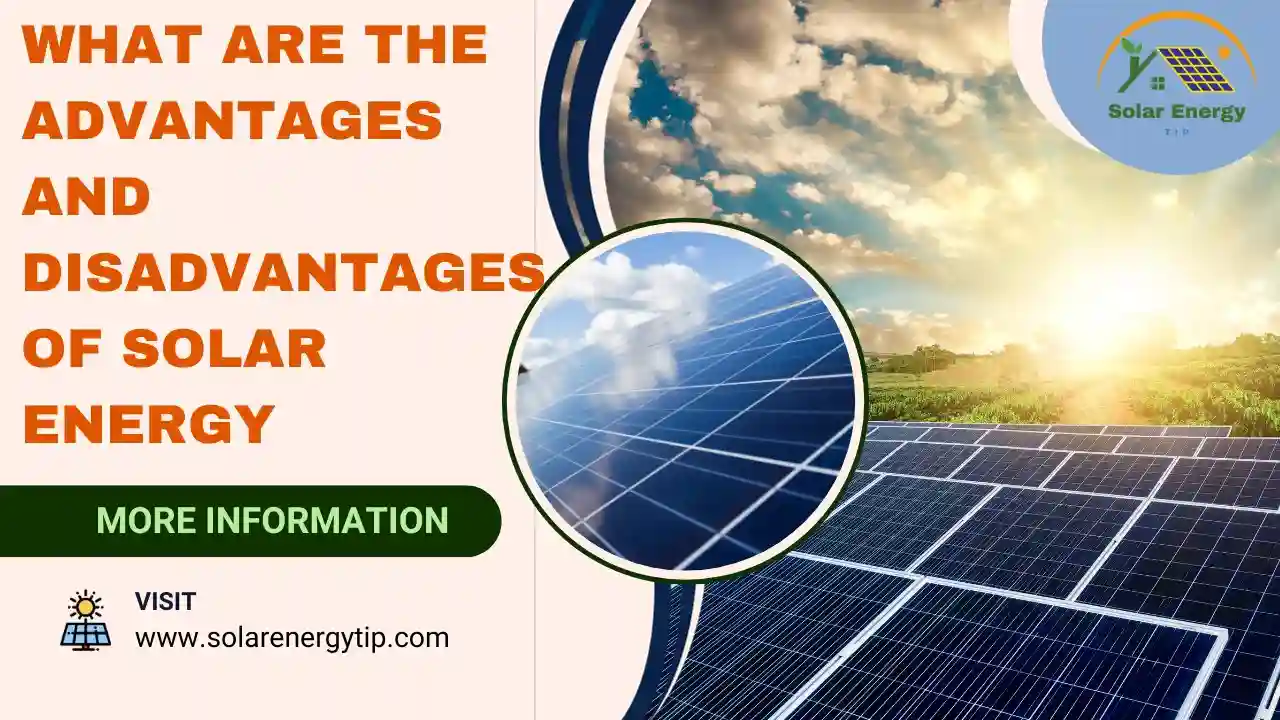When you decide that you are going to use solar power in your home, apartment, building, or business space, you will need to find out what are the advantages of solar energy.
Looking to go green with solar power? I feel you.
According to the Our World in Data website, 940 million people worldwide, or 13%, do not have access to electricity.
In this guide, I’ll lay out the 19 best advantages of solar energy, from slashing electric bills to sticking it to the utility man.
But I’ll also keep it real about the 13 disadvantages, like costs and land use issues.
My goal is to give you the full scoop so you can decide if solar is right for your home. Together, let’s shine a light on this complex topic.
- What is Solar Energy? 🌞
- Advantages and Disadvantages of Solar Energy
- What Are The Advantages of Solar Energy? 16 Pros Here
- 1. Renewable
- 2. Clean
- 3. Reduces Electricity Bills
- 4. Energy Independence
- 5. Low Maintenance
- 6. Versatile
- 7. Job Creation
- 8. Scalable
- 9. Noise-free
- 10. Peak Energy Production
- 11. Improves Home Value
- 12. Government Incentives
- 13. Low-Risk Investment
- 14. Quick Installation
- 15. Mobile power
- 16. Long-term Return on Investment
- 17. National Security
- 18. Rural Electrification
- 19. Grid Resiliency
- What Are The Disadvantages of Solar Energy? 13 Cons Here
- Why Are Solar Panels Good for The Environment?
- How is Solar Energy Good for the Environment?
- Are Harmful Effects of Solar Energy?
- Uses of Solar Energy
- FAQs
- What are the main advantages of solar energy?
- What is the form of solar energy?
- How is solar energy converted into electricity?
- Are solar panels a good investment in the USA?
- How long do solar panels last?
- Can I go off the grid entirely with solar power?
- What government incentives are available for solar installations in the USA?
- Conclusion
What is Solar Energy? 🌞
Sunlight is an important reusable energy source for converting solar energy into electrical energy through solar panels.
We can use solar energy as clean energy through technology. Solar energy has the least negative effect on the environment compared to other energy sources.
Advantages and Disadvantages of Solar Energy
Let’s discuss some pros and cons of solar energy…
Advantages of Solar Energy
- Renewable
- Clean
- Reduces electricity bills
- Energy independence
- Low maintenance
- Versatile
- Job creation
- Scalable
- Noise-free
- Peak energy production
- Improves home value
- Government incentives
- Low-risk investment
- Quick installation
- Mobile power
- Long-term return on investment
- National security
- Rural electrification
- Grid resiliency
Disadvantages of Solar Energy
- High upfront cost
- Intermittent power
- Large land area
- Limited locations+
- Toxic materials
- Not fully sustainable
- Grid connection issues
- Weather dependence
- Land use conflicts
- Aesthetic concerns
- Electricity exports
- Water used for cleaning
- Job losses in other energy sectors
What Are The Advantages of Solar Energy? 16 Pros Here
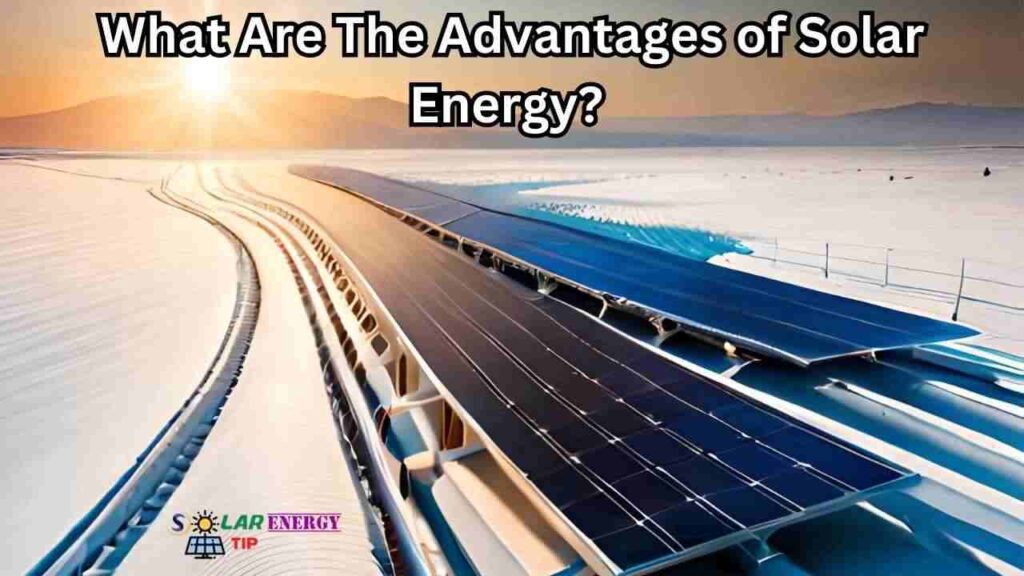
If you want to know more about the additional aspects of solar energy and the advantages of solar energy, consider the following advantages of solar energy in points.
1. Renewable
Solar power is renewable and unlimited. The sun will keep shining for billions of years to come, so we’ll never run out of this clean energy source.
2. Clean
Solar energy does not pollute the air or create greenhouse gases and toxic waste like burning fossil fuels does. It’s much better for the environment.
3. Reduces Electricity Bills
Putting solar panels on your roof can eliminate or greatly reduce your monthly electric bill after recovering the initial installation cost.
4. Energy Independence
Home solar allows you to be energy independent and immune to volatile electricity prices from the utility company.
5. Low Maintenance
Solar panels are super reliable and need little maintenance over their 20-25-year lifespan. Just keep them clean and they’ll keep working.
6. Versatile
Solar energy has versatile applications for electricity, heating, hot water, cooking, etc. It’s an extremely flexible energy source.
7. Job Creation
The booming solar industry creates many new American manufacturing and installation jobs and workforce training opportunities.
8. Scalable
Solar electric systems can be sized to meet your specific needs, from a few panels on a cabin to huge solar farms covering acres of land.
9. Noise-free
Solar panels generate emissions-free electricity silently without any noise pollution. They’re perfect for homes and neighborhoods.
10. Peak Energy Production
Solar panels produce the electricity during peak afternoon hours when electricity demand is highest. It matches energy production to peak times.
11. Improves Home Value
Installing solar panels may increase the resale value of your home. Home buyers appreciate renewable energy and energy bill savings.
12. Government Incentives
Many state governments and utility companies provide generous rebates, tax credits, and other incentives to promote the adoption of solar power.
13. Low-Risk Investment
Investing in solar panels is a relatively low risk since they require no fuel and have minimal maintenance expenses over their long lifespan.
14. Quick Installation
Solar panels can be installed rapidly on building rooftops or ground-mounted in fields. Larger utility projects take more time.
15. Mobile power
Small portable solar panels and batteries can provide off-grid electricity for remote areas, vehicles, boats, RVs, and more applications.
16. Long-term Return on Investment
In the U.S., the typical payback period is around 8 years. If installation costs $20,000, you could save up to $2,500 per year on energy bills.
Once paid off, solar panels provide 20+ years of free electricity. Read on to learn how solar energy works and whether it poses any risks.
17. National Security
Local solar energy improves America’s independence and security while reducing dependence on imported fossil fuels.
18. Rural Electrification
Solar power can provide affordable, clean electricity to rural villages and remote areas without access to an electric grid.
19. Grid Resiliency
Distributed home and business solar connected to the grid provides redundancy and resiliency to help prevent grid power outages.
What Are The Disadvantages of Solar Energy? 13 Cons Here
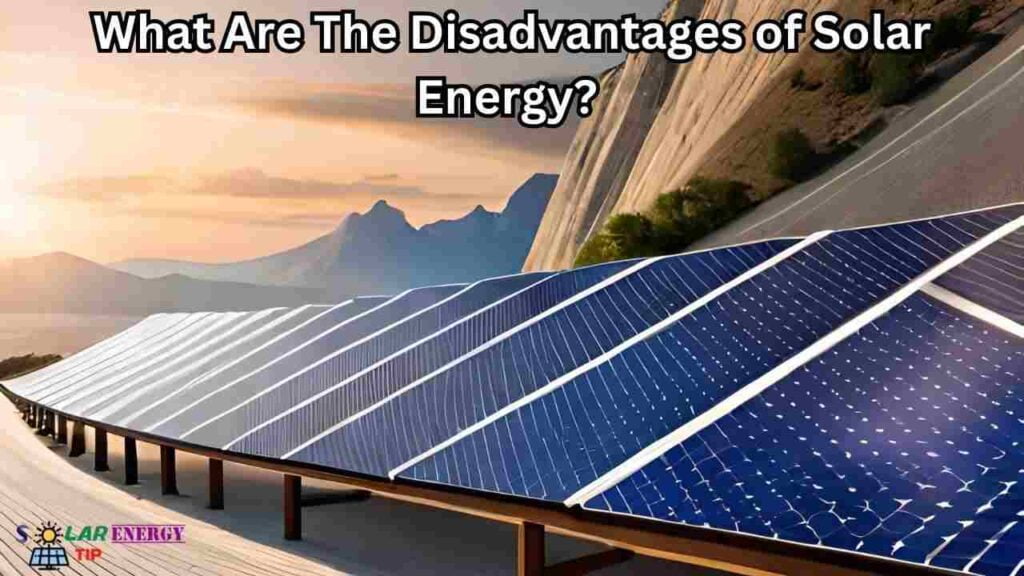
1. High Upfront Cost
Although they save money long-term, the upfront cost to purchase and install solar panels can be too high for some homeowners’ budgets.
2. Intermittent Power
Solar energy cannot be generated at night, and output varies based on weather conditions, like clouds blocking the sun. Battery storage is needed for 24/7 power.
3. Large land Area
Solar farms require clearing many acres of open land that could otherwise be used for development or agriculture. Roof space limits smaller systems.
4. Limited Locations
Solar power is far more effective and economical in sunny locations without shading. Performance varies greatly depending on regional sunlight levels.
5. Toxic Materials
Producing solar panels generates some toxic materials like lead that must be properly disposed of at the end of their usable lifespan.
6. Not fully Sustainable
While solar panels don’t emit greenhouse gases, some emissions result from panel manufacturing, transportation, and installation.
7. Grid Connection Issues
High amounts of residential solar fed into the grid can potentially overwhelm outdated electrical infrastructure not designed for net metering.
8. Weather Dependence
Solar production fluctuates based on weather like snow, large storms, and heavy cloud cover. Back-up power is needed for extended overcast periods.
9. Land use Conflicts
Large-scale solar farms may not be compatible with farmland preservation, wildlife habitats, or recreational open spaces. Careful siting is required.
10. Aesthetic Concerns
Some homeowners feel solar panels are ugly and detract from their home’s appearance. But panel design and aesthetics continue to improve.
11. Electricity Exports
Nations with prime solar resources may choose to export a large portion of their solar power generation instead of using it locally.
12. Water Used for Cleaning
Solar panels in dusty areas or with bird droppings require large amounts of water for periodic cleaning to maintain efficiency.
13. Job Losses in Other Energy Sectors
Rapid expansion of the solar industry can lead to job losses in the fossil fuel sector as conventional power plants are decommissioned.
Why Are Solar Panels Good for The Environment?
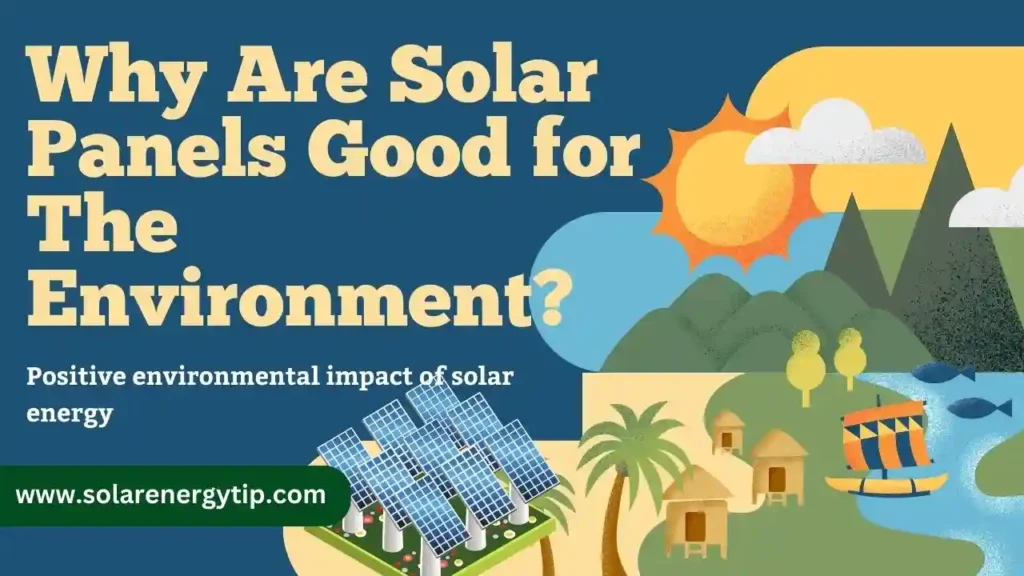
The electricity generated by solar energy does not produce any greenhouse gas that saves you from being affected by climate change. And the positive environmental impact of solar energy.
If your home or business place is powered by solar energy, no fuel is burned. And no kind of emissions from the production of energy.
How is Solar Energy Good for the Environment?
There are many power plants worldwide that generate electricity, which emits so much carbon that gases like greenhouse gases are spreading in the atmosphere. So solar energy is good for the environment.
By reducing air pollutants, solar can prevent $167 billion in health and environmental damages and save more than $24,000 lives.
Many people have a question: What are the advantages of solar energy?
This question is very important for them because the biggest benefit is to reduce climate change.
Are Harmful Effects of Solar Energy?
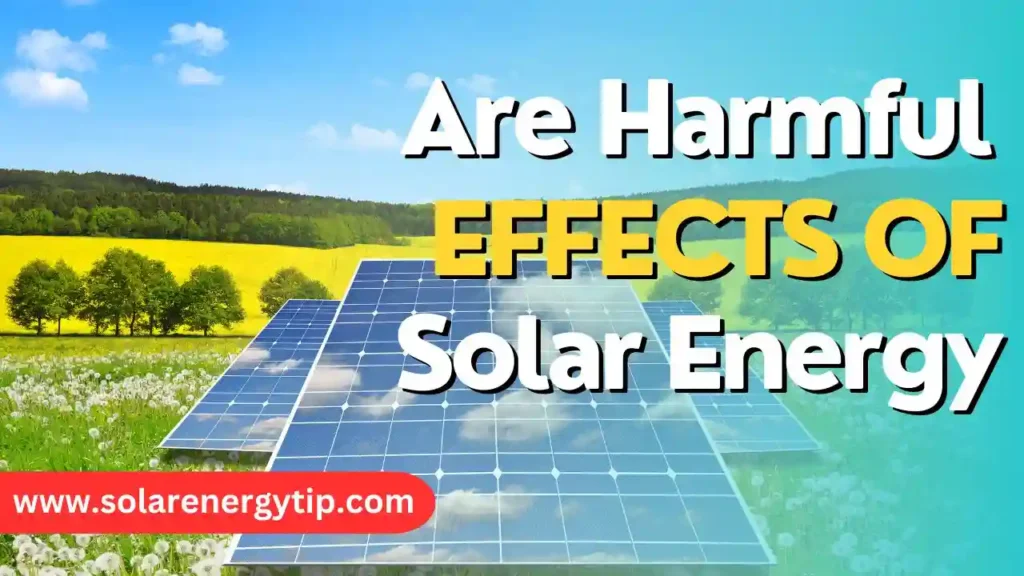
Some people say that if you use solar energy in your home to get electrical energy, it will have some negative effects on your health.
But I think how the world produces electricity now has serious health consequences. Rather, it has a negligible effect on health produced by solar energy.
Home solar electrical energy generation is secure. The electricity produced using your property sun strength machine is not distinctive from the strength you get out of your utility organization.
Solar panels safety precautions:
- Most effective use expert certified solar installation companies.
- Have your roof structure completely inspected to ensure proper structural assistance for your house solar panels.
- In no way did I attempt a do-it-yourself sun installation.
- Never try to repair a home solar system yourself.
- Have ordinary inspections of your system through a certified solar installer.
Health risks of living near solar farms:
There are quite a few electromagnetic waves around a farm produced utilizing energy storage equipment. Such strong waves are very dangerous to the body.
Human beings having electromagnetic allergic reactions quickly get sick while exposed to such situations.
Uses of Solar Energy
What is the advantage of solar energy, and what are the uses of solar energy? These kinds of questions will be on your mind.
The following is a list of uses of solar energy which you can use for yourself.
I’m glad to tell you this how solar energy is useful to us. It uses solar energy in many ways. I am using solar energy in my home and know very well about its use.
Some major US solar energy uses are:
- Solar electricity generation: Rooftop solar panels, solar farms, and solar power plants create electricity from sunshine. About 3% of US electricity is generated this way.
- Solar water heating: Solar thermal collectors heat residential and commercial water, saving natural gas and electricity demand.
- Solar space heating and cooling: Direct solar heating and cooling or solar-assisted heat pumps and HVAC systems may heat and cool buildings.
- Concentrated solar power: Large-scale solar power plants utilize mirrors to concentrate sunlight to heat a fluid and drive a steam turbine to generate electricity.
- Solar fuels/artificial photosynthesis: Artificial photosynthesis/solar fuels—Research is underway to manufacture hydrogen fuel or other sun fuels from water and CO2.
- Solar cooking: Solar cookers boil water, bake, and cook with sunlight.
- Solar drying: Solar dryers dehydrate clothes, agricultural products, and other items using solar heat and airflow.
- Photovoltaic desalination: Solar PV powers reverse osmosis devices to desalinate brackish or salt water.
- Solar vehicles: Electric automobiles, trucks, buses, and trains use solar energy indirectly.
Due to dropping solar PV panel prices, the US solar energy business has grown rapidly. The federal Investment Tax Credit also encourages solar adoption.
Most experts expect the US energy mix to increase its solar energy contribution.
FAQs
What are the main advantages of solar energy?
The most important advantage of energy is that it gives you heat and light for a lifetime.
What is the form of solar energy?
There are three forms: solar photovoltaic cells, solar thermal appliances, and solar power plants.
How is solar energy converted into electricity?
A photovoltaic cell, usually called a solar cell or PV, is the generation used to transform sun power directly into electric power. A photovoltaic cell is a nonmechanical device normally made from silicon alloys. Daylight consists of photons or debris of sun energy.
Are solar panels a good investment in the USA?
Absolutely. With falling prices and numerous incentives, solar panels offer both financial savings and environmental benefits in the USA.
How long do solar panels last?
Most solar panels have a lifespan of 25 to 30 years, with some continuing to produce electricity beyond that.
Can I go off the grid entirely with solar power?
While it’s possible, it often requires a substantial investment in energy storage systems. Many Americans choose to stay connected to the grid for added reliability.
What government incentives are available for solar installations in the USA?
Government incentives vary by location, but they often include tax credits, rebates, and net metering programs to encourage solar adoption.
Conclusion
Climate change is one of the biggest problems of the 21st century, causing global temperatures to plummet and greenhouse gas emissions to rise. What would you say is how this kind of problem can be overcome?
One of the best answers I have is to make maximum use of solar energy. But there are some drawbacks also.
You must have realized in my entire post what are the advantages and disadvantages of solar energy. All I can say is you will do it so you will use solar energy as much as possible.

